Crowded Green Rooms, Hotel Rooms and Cars: How Julia Jacklin Made Space For 'Crushing' [Q&A]
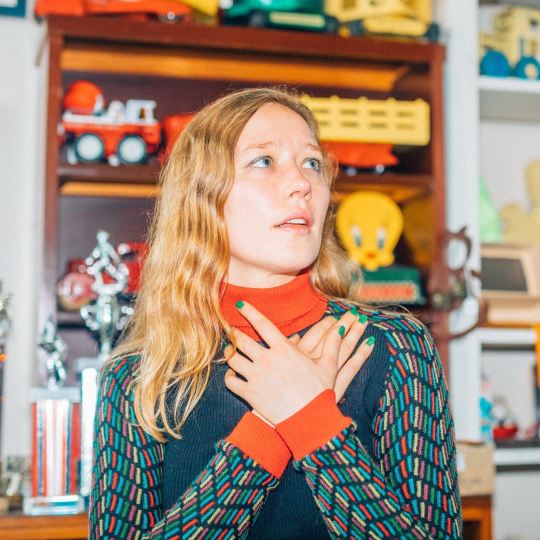
On her sophomore album, Crushing, Australian singer-songwriter Julia Jacklin performs an act of self-reclamation in ten parts. She drives away, locks herself in her room, examines her body from head-to-toe in a full length mirror, and shakes the voice of an ex-lover from her head. Jacklin wrote the material for the album over the course of a two-year-long world tour while packed into "crowded cars, crowded stages and tiny green rooms" and a corporeal desire for space rings throughout.
Jacklin's debut album, Don't Let The Kids Win (2016), was a meditation on growing up and the mental reorientations the process demands. It established Jacklin as another star in the line-up of contemporary indie-folk-rock songwriter and storytellers from down under (including Courtney Barnett, Marlon Williams, Stella Donnelley and Aldous Harding, among others). The album supported two years of consistent touring - and when Jacklin finally settled home, she culled from the collection of lyrics and diary entries she'd put down while on the road and knit Crushing together.
Released on Feb. 22, the 10-track record sees Jacklin tightening her focus on love wearing thin, love ultimately lost and an aftermath that embraces scorn and longing in equal parts. Jacklin's acknowledgment of the emotional incongruities of the breakdown process rings most true. The album opens with the five-minute burner, "Body," in which we find Jacklin jumping in a cab to leave behind a partner who's gotten them kicked off a domestic flight by smoking in the airplane bathroom. At the other end of the album, Jacklin sings "Comfort" like a lullaby to herself, repeating that her former lover will heal with time and, either way, "You can’t be the one to hold him when you were the one who left."

This push-and-pull - the tension between the comfort of space and the comfort of love - prompts us to wonder whether it's possible to hold both. Jacklin presents us with the question, and in "Head Alone," answers it by shouting, "You can love somebody without using your hands." Crushing is granted a degree of relief as Jacklin observes from afar that one can manage to be both loved and liberated.
We spoke with Jacklin the morning after she'd landed in Paris from Australia, feeling, "jet-lagged and foggy." She'd come from having a coffee and writing in her diary, a practice she's kept up since she was ten and that makes her feel that she's "accomplished at least one thing every day." We discussed dancing alone, why Crushing is not a "Me Too" album, the mythical music industry roller coaster and what it means to be truly great.
Be sure to catch Jacklin on the Crushing tour at one of the dates down below:
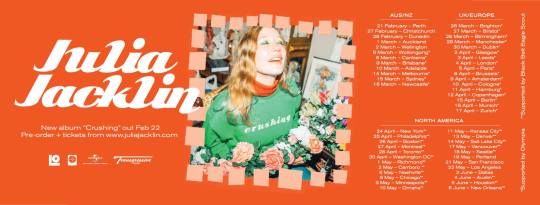
OTW: You wrote most of Crushing while touring your debut album, Don't Let The Kids Win. Where and how did you find the space to write an album while on the road?
JJ: I wrote a lot of it in the car, looking out the window. Once I got used to travel and the touring lifestyle and surrounded myself with good people who understood me, knew when I needed space and who I didn’t feel self-conscious in front of, I started to be able to write even when people were around. I wrote most of the record without a guitar in hand - I reckon I start writing 90 percent of my songs in the shower, actually. For every show, we'd have about forty-five minutes of soundcheck which gave me time to figure out the guitar patterns and chords while the band played along. That's how it all began to come together.
OTW: How did the process of writing and recording for Crushing feel different from that of your debut album?
JJ: It was worlds different. The first record was a synthesis of my whole life, for which I tried to pick the best songs from all the years leading up to it. I went into it not understanding the recording process properly and feeling very intimidated by the studio. For Crushing, I felt pretty confident in the studio, and I was able to go into it with more of a voice. I didn’t feel as much pressure as I thought I'd feel about the scary second record. That seems to be more of a myth than something any of us genuinely experience. It exists online and in the dark corners of your insecurity, but in your day-to-day life - you're still the same person who loves writing the songs you've always written.
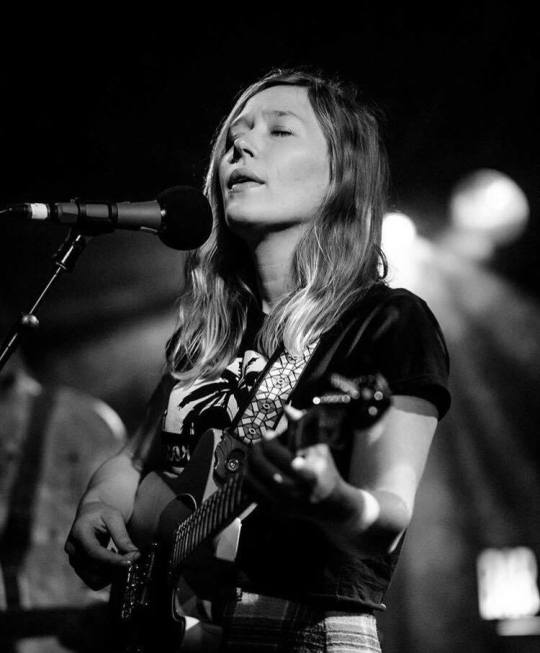
OTW: Did your newfound understanding of the recording studio works impact your songwriting for Crushing?
JJ: For me, the song comes first and production comes eighth. Production is important, but if you don’t have the song in its core, then you've got nothing. There’s no amount of layering or trickery that will make it sound good. It was actually the process of touring that helped me develop the songs by making me aware of what I wanted to play for another two years on the road. I realized that I didn't want to get up there and just play quiet, soft songs every night - I needed songs that would make me feel alive and get my blood running.
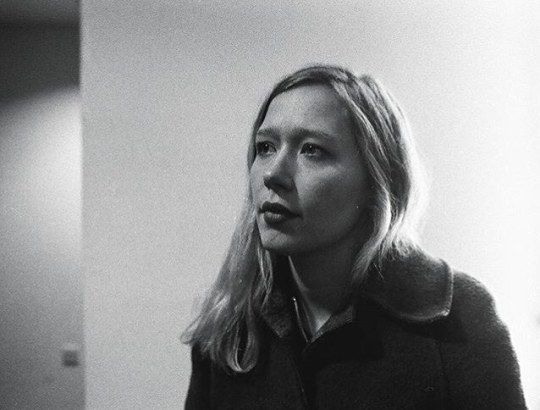
OTW: The first two singles you released off the album, "Head Alone" and "Pressure To Party," both explore the theme of ownership over one’s body. How did these come to be the first songs introducing the album?
JJ: I did the same thing for my first record - released the songs in the order that they appear on the album. That’s the way I want people to hear the record, sequentially from start to finish. There are definitely a lot of references to my body in the record - I listened back and realized that in the first five songs on the record I say something about my body. It's a hard thing to talk about - I've been doing a lot of press lately and keep getting asked, "Is this a 'Me Too' album?' and it's like, "No, it’s just the album that I’ve written about my experiences." Women have been speaking about these things forever, it just so happens that the world is paying attention right now. I spent two years in shared beds, tiny green rooms, crowded rooms, crowded stages and crowded cars. The album formed once I finished that tour and finally just threw my arms out wide and emerged from that claustrophobia.
OTW: On "Head Alone," it does feel like you’re literally breaking out of the expected song structure when you arrive at the bridge - it feels like a different song entirely. Did the bridge surprise you when you wrote it?
JJ: On this record, I was trying to find ways to express these feelings without shoving them into a typical song structure. Initially the bridge was the chorus, and I was going to repeat it. But when we were recording, I realized that I didn't want to say it again. Sometimes in songwriting the power can be in giving people something once - then they want it again, so they listen again and it's more impactful. I always think about that with Joanna Newson, one of my favorite songwriters. She's someone who manages to write a twelve minute song, and she'll say something once, but you'll remember it and it's so powerful. It's the classic "less is more."
OTW: You've directed or co-directed (with longstanding creative collaborator Nick Mkk) all of your music videos for both Crushing and Don't Let The Kids Win - when did you decide you were going to take on that role and how did you learn the ropes of directing video?
JJ: It was definitely a learning curve, but there's a lot of stuff in the creative world that you just have to learn by doing. People often don’t realize that. They think, "I need to go to school, I need to be perfect at it before I try it." Making the music videos made me realize that, in the world of creative work, nobody knows what they’re doing and everybody learns from doing it. It's like that thing when you become an adult and you're like, "Oh, nobody knows what's going on."
OTW: In about seven of your music videos, we see you dancing alone. What's the story behind this means of expression?
JJ: I've started thinking recently that music videos are kind of dumb. I appreciate that some videos are incredible, but a lot of the time, it seems so crazy for me to take a song that has its own life, narrative, and meaning, and then to try to squish a whole other narrative on top of it. That’s where the dancing comes in. Every time I think, "How I can represent this song in a simple way?" I'm like, “Oh, I’m going to dance! I'm going to dance in front of a star, I'm going to dance over here, I'm going to dance over there.” My label and my manager have said to me multiple times, "Do you reckon you’re going to do something else, maybe other than dancing by yourself? And I'm like, "Well, maybe..." and then I deliver the next music video and they're like, "Ah no, here we go."
OTW: Now that you've been steeped in the industry for a while, what have you found about it that you appreciate and that you need to take yourself away from as a means of self-preservation?
JJ: The industry is great in that it allows me to do what I do. It’s driven me into a global community of people and made me feel I really belong somewhere. There is strange thing I've realized about the music world - it seems like you're either up-and-coming, or you’ve made it, or you’re irrelevant. There's this set trajectory and you’ve got to figure out where you fit into it. Leading into this second record, I've been doing all this press and media and it's all, "up-and-coming" and "next biggest thing" and you're just like, "I thought I was just doing my thing, I didn't realize I was on some strange ascent on a roller coaster." It's strange how we try to stick artists into some box where we perceive them to be at their career trajectory, when most of us are just going, "Oh, I thought we were all just playing music and doing our best."
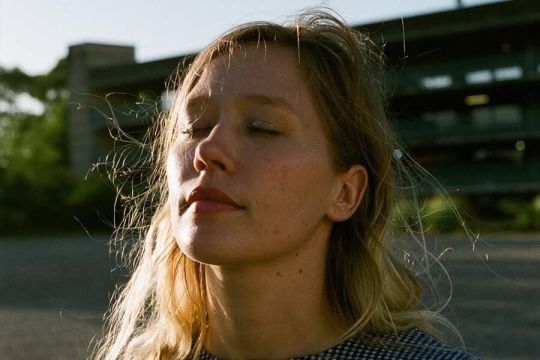
OTW: You speak about your musical contemporaries with a sense of camaraderie. I think it's great how you acknowledge your musical influences and recognize that it’s a part of the folk tradition to be guided by the work of others. Will you tell me a bit about how you experience music as a listener?
JJ: I think it's odd when an artist puts a song up on the Internet and people hop on to say, "You sound like this or that person" as a means of dismissing their creativity. Of course we're all borrowing, especially in the folk tradition - that was the whole point of the genre. I think it’s a beautiful thing to be so inspired by someone that you write a song based off of what you listen to. Watching the artists I tour with is my music school. I toured with Andy Shauf for a month last year, and that was the most influential music school I’ve ever been to. We played 17 shows and 17 festivals together, and I literally would run from my set to go watch his. I'd just stand there, just drinking it in - of course it’s going to come out your own music.
OTW: Speaking of artists whom you admire, in "Motherland" you have this line, "Will I be great? Will I be good?" If we're trying to get outside of the narrative of the emerging, the successful and the declining artist, what does greatness in an artist look like to you?
JJ: At this point, it's the artists who have clearly stayed true to themselves that I see as great. Like Japanese Breakfast - she works really fucking hard, she tries all these different mediums and I’m sure she's failed a lot, but she just put her head down and pounds through. She doesn't have to pour her heart out in every interview, but at the same time, she seems totally able to control her narrative. It's great to see artists who - even though this industry is crazy and tiring and there are so people involved in your career, so many things that can slip out of your grasp and misrepresent you - manage to rise above that environment and represent themselves truly.
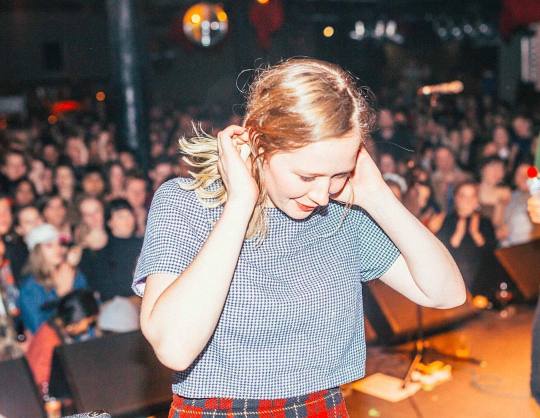

![Bella Litsa’s “Drasticism” Is Mysterious, Inevitable and Undoubtedly Your Next Obsession [Q&A]](https://s3-us-west-2.amazonaws.com/onestowatch-v2/4_i8_a1538@sandrajamphoto-1771529337.jpg)
![Novulent’s VOL. 3 Is A Feature Film with A Carefully Crafted Script [Q&A]](https://s3-us-west-2.amazonaws.com/onestowatch-v2/unnamed-1771627089.jpg)
![Inside Ally Evenson’s “SPEED KILLS” Short Film Debut at Brain Dead Studios [Q&A]](https://s3-us-west-2.amazonaws.com/onestowatch-v2/save_vid._net_637196595_18565097563019473_4760615889967315430_n-1771618679.jpg)